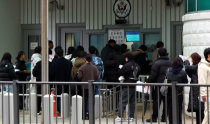Court rulings on stepmothers` killing run counter to public sentiment
Court rulings on stepmothers` killing run counter to public sentiment
Posted April. 12, 2014 06:01,
The court handed 15 years and 10 years in prison, respectively, to Park (41) in Ulsan City, and Lim (36) in Chilgok, North Gyeongsang Province, stepmothers who beat their stepdaughters to death, by applying the crime of injury resulting in death. Prosecutors had sought death penalty to Park, and 20 years in prison to Lim. Judges, however, seem to have failed to adequately reflect the nature of extremely malicious crimes committed by the two stepmothers to the severity of penalties only by blindly following the sentencing guidelines.
The court only applied to Park the crime of injury resulting in death, rather than adopting the murder charge. Prosecutors did not even indict Lim with the murder charge in the first place. According to the exemption law on punishment of child abusers that has been enacted following the stepmothers abuse case in Ulsan, and which will take effect beginning in September, the court can sentence the abuser to up to life in prison for the crime of injury resulting in death through child abuse, even if the murder charge is not applied. Since the two cases occurred before the laws enactment, however, they have not been subjected to the new law.
Park beat her seven-year-old stepdaughter for stealing 2,300 won (2.22 U.S. dollars) and blocked her from going on school picnic last year. When the stepdaughter told her Mom, I am sorry, but I want to go to picnic, she beat the child to death. Lim beat her eight-year-old stepdaughter to death, and even laid the blame on her 12-year-old stepdaughter. Considering the way they beat the children and acted, it is believed that they just thought to themselves, It is okay even if you die. Advanced countries broadly apply willful negligence for murder when involving children, who have no capacity to defend them. The Korean court needs to more proactively consider willful negligence for murder caused by child abuse as well.
Prosecutors said they will appeal the lower court ruling on Parks case, because murder charge was not applied to her. Prosecutors are also considering appealing the case of Lim, who has been handed half the punishment sought by the prosecutors for injury resulting in death, by adding the murder charge. Prosecutors move should not be merely an act intended to hold the court responsible in order to dodge public criticism for the courts rulings. With the determination to punish the stepmothers with the murder charge, prosecutors should demonstrate willfulness of the murders the stepmothers committed in a more persuasive way.
Like any other crimes, prevention rather than punishment is priority for child abuse as well. The revised act on child welfare took effect in 2012 that requires those who fail to implement the obligation to report child abuse to authorities to face fines. However, fine has been levied in just a single case thus far. Even in the latest two cases, if anyone of school teachers, child protection organization workers, or police responded with sense of responsibility, the deaths could have been prevented. More than anything, information sharing between schools, child protection organizations, and police is also important. The perception that child abuse is no longer an issue within a family should spread across the entire society.






![노동신문 개방? 노동신문 서버는 개방을 견뎌낼까?[주성하의 ‘北토크’]](https://dimg.donga.com/c/138/175/90/1/wps/NEWS/IMAGE/2025/12/26/133032325.1.jpg)
